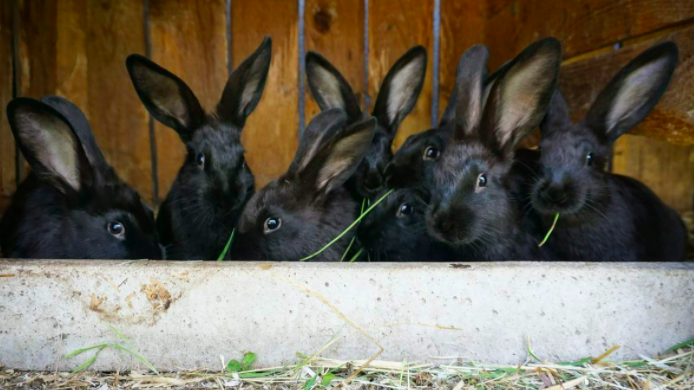Rabbit farming, also known as Cuniculture, is the farming method of breeding and raising domestic rabbits for their meat, fur, or wool as livestock. Rabbit farming is also used in the production and enhancement of rabbit breeds by rabbit fanciers and hobbyists and in the demonstration of these efforts. Rabbit farming is practised by scientists in the use and management of rabbits in science as model organisms. Rabbit farming has been practised since at least the 5th century in the world. Not only profitable, but rabbit farming is also fun.
A rabbit can be raised as a pet and even grown without much investment in a small property. Rabbits have been reared for a long time in our country. Commercial rabbit farming in India has many benefits. Bunnies are tiny and adorable creatures. They are delicate, which makes them a good source of meat. There is a very strong market demand for rabbit meat and there are inadequate suppliers to satisfy this rising demand. Hence, the scope for people in this field is high and the time to venture in is now. It is a corporation that has low expenses and high income.
There is a strong demand in India as well as in foreign countries for fur obtained from Angora rabbits because it can be a profitable business venture. Rabbit meat is also eaten in India by a limited population that can further contribute to the revenue generated from the marketing of fur.
In India, there are some particular breeds that are ideal for rabbit farms. They are- White Giant, Grey Giant, Flemish Giant, New Zealand White, New Zealand Red, Californian, Dutch and Soviet Chinchilla. These are ideal for farming in India (according to the weather).
HOW TO DO RABBIT FARMING IN INDIA
If you are a beginner, who is looking at opportunities to start rabbit farming in India, here are some tips, details and information that should give you an overview of the process and business, and will help you get started with rabbit farming.

- The first step to starting rabbit farming is picking a breed and finding a case for housing them, then think about the method of caring. In particular, learn about their natural behavioural strategies and most notably, the process of feeding. Moreover, learn about their reproduction cycle and rapid growth tips to ensure profits in your business.
- For their house and cage, here are some things you need to keep in mind before starting off.
You need to make sure that you have a safe atmosphere on the farm. Otherwise, the production would be slowed. Even if you grow rabbits as a pet, you’ve got to understand their actions and the safety measures needed.
- The minimum recommended size is 1.1 metres (12 sqft.) for living space, 2-3 metres (depending on the height of the rabbit) and 9.7 metres (32 sqft.) for playing or moving.
Rabbits can be raised anywhere. Rabbits love the tranquil atmosphere as the ideal house. They do not thrive well in hot areas. They are, however, safe under a shade or tree in a home that has protection against heat exhaustion or hypothermia.
For their cages, keep these things in mind:
- Multiple compartments: A rabbit needs a hutch or cage of a good size, preferably with two chambers.
- Materials for the cage: The cage must be made of steel and timber. If you make a cage with wood, it will be more efficient.
- Playing space: If you grow them commercially, a minimum amount of running/exercise space must be considered (able to take three hops). This is critical and guarantees healthy pets.
The maintenance of these cages is as important as getting the perfect cage. Good maintenance increases productivity decreases diseases, encourages good health and is directly linked to more successful rabbit farms.
- Here are some tips to help you maintain the cage. You should keep the Does and Bucks in separate pens and should only be kept together throughout the breeding season. Always make sure the water and grain containers are clean. Keep the hatch in a sunny place and let the fresh air come in. Provide the nest box in time for breeding.
In addition, clean the cages with one cup of chlorine bleach mixed into a gallon of water to prevent diseases from time to time (once a month preferably).
Now, one of the most important things is feeding the rabbits; what to feed them and how to feed them.
- Rabbits love to eat pellets, fresh vegetables and hay. The best foods that promote healthy nutrition are— Hay, Green grass and vegetables, fruits, pellets (minimum 18 per cent fibre). Bread, avocado, chocolate, biscuits, potatoes and rice are not supplied with these feeds, however.
- Typically, within 5 to 6 months of age, rabbits become mature and suitable for breeding purposes. But don’t use the male rabbits before their first birthday for breeding purposes. Doing this would ensure the commercial production of quality young rabbits. Often try to use good rabbits for breeding, with sufficient body weight. Don’t breed women if they are sick. Take special care to provide good food for the breeding male and pregnant female rabbits. The gestation period is around 28 to 31 days for rabbits. And a doe can give birth to 2 to 8 children each time.

These tips should give you an idea of the requirements and the supplies needed to start a rabbit farm. This will give you a head start for buying the necessities and how to start this business.
ADVANTAGES OF RABBIT FARMING
Now that we have spoken about most things related to rabbit farming, from what it is to how you can start, we will discuss why you should venture into this field. We will discuss how it is a profitable business, what are advantages do rabbits and rabbit farms hold and why you should get into this business. Here are some advantages of rabbit farming:
- With some females developing 25 to 50 kits (young rabbits) per year they are extremely prolific.
- Rabbit meat is high in poly-unsaturated fatty acids (PUFAs), which are known as white meat.
- Small groups (up to 50 in number) can be kept with kitchen waste as feed for rear rabbits in the backyard of the house.
- The initial rabbit farming investment costs are low, along with rapid returns (about six months after the establishment of the farm).
- They are the best wool producers on the basis of body weight per kilogramme and need 30 per cent less digestible energy to produce 1 kg of wool than sheep.
- They also have revenue from kits, poultry, pelt, and manure sales.
- Rabbit manure is highly acceptable for vermicomposting, which offers outstanding manure to be used in agricultural fields as an organic fertiliser.
- The wool of a rabbit is 6-8 times colder than the wool of a modern sheep.
- Rabbits feed on forages of perse origin because they require much less amount of expensive feed concentrate and can be reared on roughage.
People typically raise rabbits as pets. But it can be a great source of income and a smart form of employment to lift them commercially. Worldwide, the annual demand for meat is growing rapidly. This huge demand is being controlled by poultry, beef and pork meat right now. The development of commercial rabbits may play a very important role in meeting this demand, so the rabbit farming company has a great scope.
SUMMING UP
We have tried to cover all the topics that one will need to start the farm in this blog. From the type of breed and cage to the breeding period and food, you will find everything needed to get started with a rabbit farm on this blog. Rabbit farming is a profitable business and rabbits can be kept both commercially and as a pet.
You will make full profits from your rabbit farming company by managing it properly and taking complete care of the rabbits and the farm. Do try to take care of your animals well. Feed them high-quality nutritious food, keep their house clean and start by buying healthy breeds. You can thus make your rabbit farming company highly profitable.
You can read about our other blogs HERE!


One Response
I’m interested rabbit farming